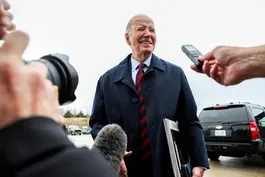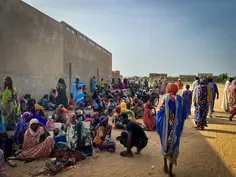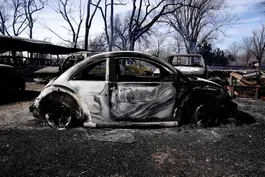
Measles outbreak raises concerns about drop in vaccinations
Clip: 3/6/2024 | 5m 55sVideo has Closed Captions
Measles outbreak raises concerns about drop in vaccinations
There were 58 reported cases of measles in the U.S. during all of 2023. But there's already been 41 cases across 16 states so far this year. The outbreak of this highly contagious virus is cause for concern for many public health departments. Dr. Paul Offit, a pediatrician specializing in virology and immunology at Children's Hospital of Philadelphia, joins William Brangham to discuss.
Problems with Closed Captions? Closed Captioning Feedback
Problems with Closed Captions? Closed Captioning Feedback
Major corporate funding for the PBS News Hour is provided by BDO, BNSF, Consumer Cellular, American Cruise Lines, and Raymond James. Funding for the PBS NewsHour Weekend is provided by...

Measles outbreak raises concerns about drop in vaccinations
Clip: 3/6/2024 | 5m 55sVideo has Closed Captions
There were 58 reported cases of measles in the U.S. during all of 2023. But there's already been 41 cases across 16 states so far this year. The outbreak of this highly contagious virus is cause for concern for many public health departments. Dr. Paul Offit, a pediatrician specializing in virology and immunology at Children's Hospital of Philadelphia, joins William Brangham to discuss.
Problems with Closed Captions? Closed Captioning Feedback
How to Watch PBS News Hour
PBS News Hour is available to stream on pbs.org and the free PBS App, available on iPhone, Apple TV, Android TV, Android smartphones, Amazon Fire TV, Amazon Fire Tablet, Roku, Samsung Smart TV, and Vizio.
Providing Support for PBS.org
Learn Moreabout PBS online sponsorshipGEOFF BENNETT: In all of last year, there were a total of 58 reported cases of measles in this country, but just three months into this year, there have already been 41 cases across 16 states.
The outbreak of this highly contagious virus is concerning public health departments.
And William Brangham delves deeper into why it's occurring.
WILLIAM BRANGHAM: Geoff, thanks to widespread vaccination, measles was declared eliminated from the U.S. back in 2000.
So seeing these outbreaks in different states, while they're still small in number of cases, has been disturbing to many.
Dr. Paul Offit is a pediatrician at the Children's Hospital of Philadelphia who specializes in virology and immunology.
His new book about where we are in our struggle against COVID is called "Tell Me When It's Over."
Dr. Paul Offit, welcome back to the program.
I just want to put up this graph that shows the rising number of cases of measles over the last few months.
It starts there on the left in '23 and goes all the way up to the present.
What is your understanding of what is driving this uptick?
DR. PAUL OFFIT, Author, "Tell Me When It's Over: An Insider's Guide to Deciphering COVID Myths and Navigating Our Post-Pandemic World": A critical percentage of parents are choosing not to vaccinate their children.
The CDC recently put out data in the last few months showing that the rate of immunization among kindergartners is starting to drop, and it's not surprising that this is the disease you see, because this is the most contagious of the vaccine-preventable diseases.
WILLIAM BRANGHAM: Well, the CDC just said that 92 percent of American kids have received the MMR vaccine -- that's measles, mumps, and rubella -- that's a few notches below 95 percent that gets us to herd immunity.
That percentage is enough to make a difference?
DR. PAUL OFFIT: Yes, absolutely.
To put this in perspective, there's something called the contagiousness index, meaning how many people would you infect during the day, assuming you're infected and everybody you come in contact with is susceptible?
For diseases like COVID or influenza, the contagiousness index is about two to three.
For measles, it's 18.
One case of measles is concerning just because you sense it may be the tip of a much bigger iceberg.
WILLIAM BRANGHAM: I don't mean to date you with your age here, but I know you had measles as a child.
This was before the vaccine was available.
For people who don't remember, can you just remind us, what is this disease like?
How serious of a virus are we talking about?
DR. PAUL OFFIT: Right.
So, before there was a measles vaccine in 1963, every year in this country, there would be three to four million cases of measles.
There would be 48,000 people hospitalized, mostly children less than 15 years of age, and there'd be 500 people who died, again, mostly children.
When they died, they died from severe dehydration or severe pneumonia or encephalitis, which is inflammation of the brain.
It is a terrible disease, and I think what we're suffering right now is not just that we're not seeing measles in the manner we used to before, but I think we're -- we don't remember measles.
I think we don't remember just how sick this virus can make you.
WILLIAM BRANGHAM: One of the things we have also seen is some somewhat confusing and conflicting official guidance.
We know, in Florida, there was an outbreak at a school, and the state surgeon general there sent a letter to families that seemed to contradict all the official guidance.
He didn't recommend that parents get vaccinated.
He didn't recommend that unvaccinated children who had been exposed quarantine themselves.
I mean, how are people supposed to know what to do if they're getting this mixed message?
DR. PAUL OFFIT: Well, the messaging that they were getting from Dr. Joseph Ladapo here and in Florida was the wrong message.
I mean, there are essentially two weapons in the armamentarium of public health officials when you see a measles outbreak.
One is isolation of people who are infected.
They need to isolate for 21 days.
And two is vaccination.
By giving a very soft sell for both of those, I think Dr. Ladapo has the potential to do a lot of harm.
WILLIAM BRANGHAM: I mean, we are talking about this in terms of a larger decline in public faith in public health.
And this is something you deal with in your new book.
And you point out too some missteps that the FDA took back during the COVID pandemic and other federal officials.
How do we go about repairing this breach so that, when the next outbreak comes, people know where to get good, smart information?
DR. PAUL OFFIT: I think by mandating COVID vaccines, we inadvertently leaned into this libertarian left hook.
So now you have hundreds of pieces of legislation pushing back against vaccine mandates, against masking mandates, because this was seen as an issue of personal freedom, of bodily autonomy.
But it's not a personal choice when you talk about measles, because it's a contagious disease.
So when you make a decision for yourself, you're also making a decision for others.
And, remember, there's about nine million people in this country who can't be vaccinated because they're getting chemotherapy for their cancer or because they have a solid organ transplant or a bone marrow transplant.
They depend on those around them to be protected.
Do we have any responsibility to our neighbor?
I think we do.
WILLIAM BRANGHAM: But that's the argument that was made during COVID.
And again we're making it now during measles.
And yet we're still seeing this resistance, this pushback, both legislatively and personally.
I mean, this is going to be an enormous challenge, it seems, for the country going forward.
DR. PAUL OFFIT: No, I think that's right.
I think that now, under the name of personal choice or individual freedom, we have now incorporated vaccines.
I think, in some sectors, the word vaccine has become a dirty word.
And, as a consequence, what we're seeing is the children are now suffering a disease they don't need to suffer, because it's invariably the most vulnerable among us who suffer rare events.
WILLIAM BRANGHAM: All right, Dr. Paul Offit, Children's Hospital of Philadelphia.
The new book is called "Tell Me When It's Over."
Always good to see you.
Thank you very much.
DR. PAUL OFFIT: Thank you.
Author Paul Lynch on his prize-winning dystopian novel
Video has Closed Captions
Clip: 3/6/2024 | 6m 55s | Author Paul Lynch discusses his Booker Prize-winning dystopian novel (6m 55s)
Biden prepares for annual State of the Union address
Video has Closed Captions
Clip: 3/6/2024 | 5m 55s | White House press secretary Karine Jean-Pierre on Biden's State of the Union address (5m 55s)
How Sudan's civil war has created a massive hunger crisis
Video has Closed Captions
Clip: 3/6/2024 | 9m 8s | How Sudan's civil war has created a massive hunger crisis (9m 8s)
Nikki Haley ends campaign, setting up Biden-Trump rematch
Video has Closed Captions
Clip: 3/6/2024 | 6m 1s | Nikki Haley ends White House bid, setting up a Biden-Trump rematch (6m 1s)
Texas residents struggle to recover from historic wildfires
Video has Closed Captions
Clip: 3/6/2024 | 5m 24s | Beleaguered Texas residents struggle to recover from historic wildfires (5m 24s)
Providing Support for PBS.org
Learn Moreabout PBS online sponsorshipSupport for PBS provided by:
Major corporate funding for the PBS News Hour is provided by BDO, BNSF, Consumer Cellular, American Cruise Lines, and Raymond James. Funding for the PBS NewsHour Weekend is provided by...
















